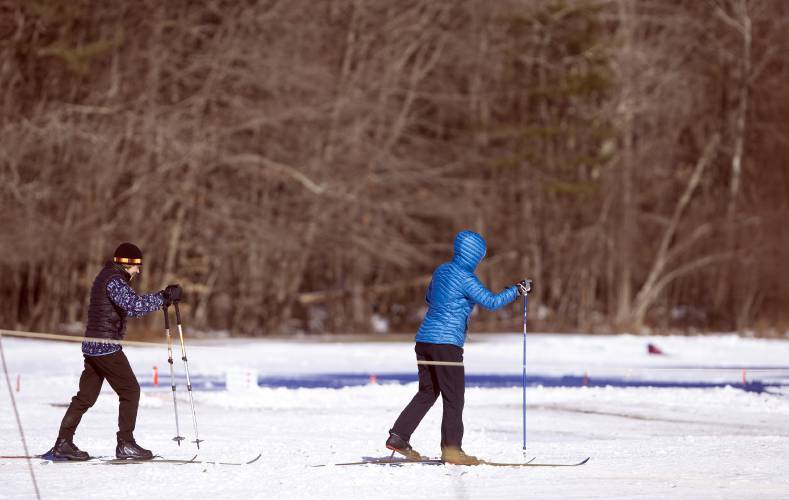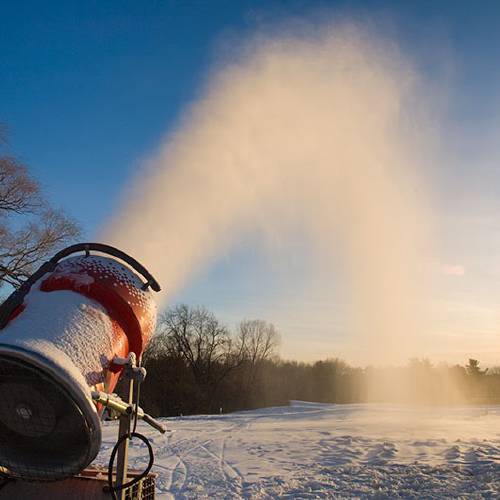Opinion: Snowmaking in an era of disappearing snow
| Published: 06-26-2024 7:00 AM |
Sam Evans-Brown is the chair of Ski The Beav, which works to improve skiing at the Beaver Meadow Municipal Golf Course.
Recently, a reader’s Letter to the Editor (“City’s snow devices deemed ironic amid climate crisis, economic strain,” Monitor, 6/10) ridiculed the city for pursuing snowmaking equipment at the Beaver Meadow Golf Course. I’d like to correct several key misconceptions.
Most importantly, stating that funds for snowmaking would be coming from taxpayers is completely false. In fact, the proposed funding in the city budget is marked as “donations,” because it will be raised entirely from private funds by Ski The Beav, a nonprofit that was created to promote cross-country skiing at the city-owned golf course. We have also proposed that operating costs could be offset by donations and user fees. We’d also propose that access to skiing be maintained by introducing a system of graduated fees and by expanding the fleet of skis that we already make available for anyone to borrow at no cost, so that access to skiing is preserved for those with limited financial means.
There is also the implication that snowmaking is fundamentally at odds with the urgent need to fight climate change.As someone who has dedicated my professional life to solving the problems presented by climate change, and as the chair of Ski The Beav, which is pursuing the snowmaking project, I am here to say that making snow on a warming planet is not a contradiction. In fact, the reductions in carbon emissions could be quite dramatic if snowmaking provides cross-country skiing at Beaver Meadow.
For starters, snowmaking doesn’t actually result in much pollution, and our operation would be quite small. Most snowmaking systems are 100 percent electric, and electricity use at night already emits less CO2 than electricity use during the day, because it tends to involve less burning of natural gas, and be more composed of hydropower, nuclear and wind energy. Electricity is also the easiest sector to decarbonize, and is already well underway. Emissions from New England’s electricity sector have declined 55 percent since 1997. Crunching some back of the napkin numbers, we estimate that making enough snow for 2km of XC skiing here locally would emit about 10 tons of CO2 for the whole season, which is about half the amount that the average American emits in a year.
In other words, snowmaking isn’t a big driver of climate pollution. And that’s just one side of the ledger. We believe that there will be carbon savings associated with snowmaking too. Let’s say that, due to poor local snow conditions, cross-country skiers in Concord and nearby towns drive an hour north (or more!) to find decent snow-covered trails on a given day. If just 20 cars head north, each burning about 5 gallons of gas, that’s about 100 gallons of fuel burned and a ton of CO2 emissions. Multiply that out over the course of a season, we could be talking about avoiding hundreds of tons of carbon emissions from less driving.
And snowmaking could save Concord taxpayers money too. Due to poor local conditions last winter, the Concord High School Nordic team was only able to hold five practices at Beaver Meadow. This led to them traveling two to three times a week to Andover or Holderness, where they could ski on human-made snow. We’re incredibly fortunate in Concord that our school system supports the team’s travel, but bear in mind that the cost of bus transportation to ski-able snow is already being paid for by Concord taxpayers. Snowmaking at Beaver Meadow would reduce those costs to taxpayers and local skiers.
But back to emissions. The reality is we won’t solve climate change through nipping and tucking a few tons of CO2 here or there. We need a wholesale transformation of our society’s energy system.
Article continues after...
Yesterday's Most Read Articles
That’s the problem I’m working on in my professional life. In fact, I’ve devoted my career to promoting a cleaner, sustainable energy system because I love the outdoors. And because I’m a cross-country skier, I have spent my entire life watching the activity that I love most dearly melt away a little bit more each year.
To fight climate change, we need political will. As a ski coach, I’ve seen that more than a decade’s worth of high school skiers have come to fully understand climate change by being outside, on our melting snowpack, every day. If we want to fight climate change, we need to give the next generation things to fight for – and for some of us, the thing we’re fighting to save is skiing and snow.









 Opinion: Outlines of a new dystopia
Opinion: Outlines of a new dystopia Opinion: Speechless in America no more
Opinion: Speechless in America no more Opinion: Friends don’t let friends drive drunk
Opinion: Friends don’t let friends drive drunk Opinion: Concord should be run like a household, not a business
Opinion: Concord should be run like a household, not a business
